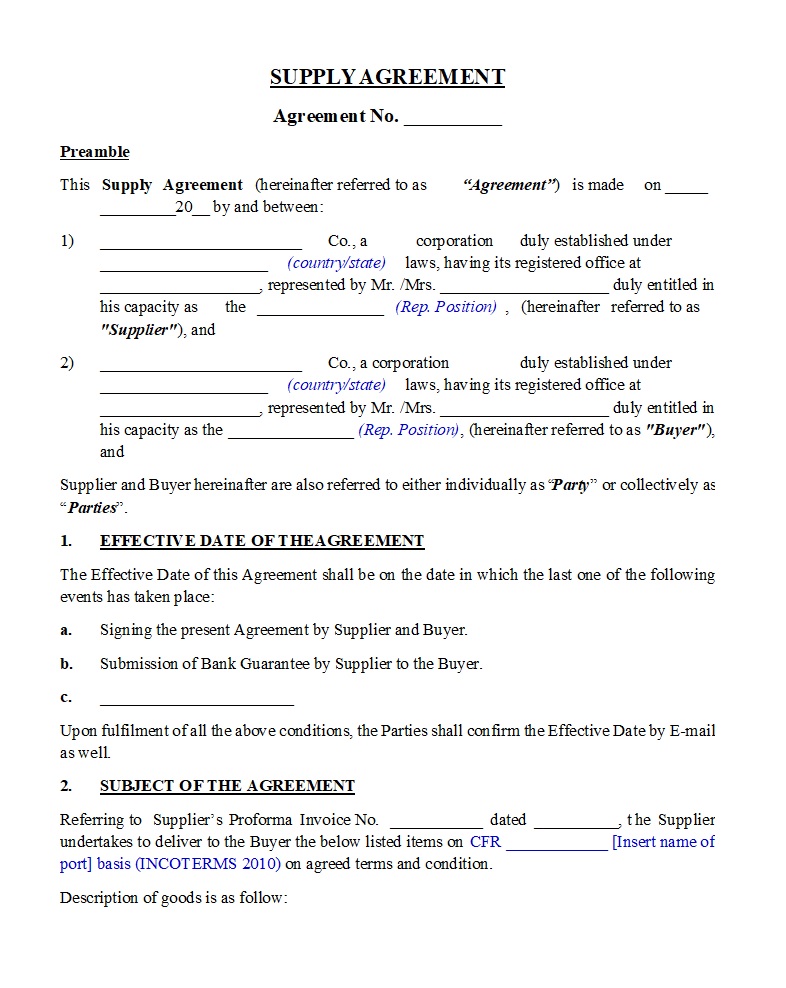Estimated reading time: 3 minutes
A Supply Agreement, also known as a purchase agreement or supply contract, is a legally binding contract between a buyer and a seller. It outlines the terms and conditions under which goods or services will be provided. These terms include the type, quantity, and quality of products or services, pricing details, delivery obligations, payment terms, and remedies for breach.
Such agreements serve as the foundation for stable commercial relationships. By clearly defining responsibilities and expectations, they reduce ambiguity, mitigate legal risks, and support smoother operational workflows.

Core Elements Every Supply Agreement Should Include
To function effectively and avoid disputes, a supply agreement should contain several essential clauses:
1. Scope of Supply
This clause defines what exactly is being provided. Specifications, quality standards, and compliance requirements must be detailed to ensure mutual understanding and accountability.
2. Pricing and Payment Terms
The contract should state unit prices, applicable taxes or discounts, and deadlines for invoicing and payment. It’s important to include mechanisms for price adjustment, especially in long-term agreements.
3. Delivery Terms and Risk Allocation
Timelines for delivery, shipping methods, responsibility for transportation, and the point at which risk passes from seller to buyer should all be outlined to prevent misunderstandings.
4. Contract Duration and Termination Rights
A clear start date, duration, renewal process, and termination rights (for both breach and convenience) help parties manage the contract life cycle effectively.
Why a Supply Agreement Matters
A well-drafted supply agreement is more than a legal formality—it’s a strategic business tool. Here’s why:
- Stabilizes Supply Chains: It ensures that goods or services are delivered consistently and according to agreed terms, even during uncertain times.
- Controls Costs: Setting fixed or adjustable pricing frameworks allows companies to plan budgets with confidence.
- Minimizes Legal Exposure: Clear terms reduce the likelihood of litigation, and built-in dispute resolution clauses offer ways to resolve issues without going to court.
- Strengthens Partnerships: Trust and transparency grow when each party knows their rights and duties, fostering long-term collaboration.
Without such a contract, businesses risk delays, pricing disputes, and reputational damage due to inconsistent supply or unmet obligations.
Drafting an Effective Supply Agreement
While many companies use templates to save time, a custom-drafted supply agreement is almost always preferable. Tailoring the contract to specific business needs allows for greater risk management and legal protection.
Consider including:
- Force Majeure Clauses for unforeseen disruptions
- Indemnity and Limitation of Liability Clauses
- Inspection and Rejection Rights to safeguard quality control
- Performance Benchmarks to measure supplier reliability
Legal advice is recommended to ensure compliance with local and international regulations, especially in cross-border supply relationships.
Conclusion
A Supply Agreement is a critical instrument for maintaining operational continuity, managing supplier relationships, and protecting your business from unforeseen risks. Whether you are procuring raw materials or outsourcing services, taking the time to draft a comprehensive, customized agreement will pay dividends in reliability, clarity, and peace of mind.
Read more in the following topics for your information:
Access the Full Contract Directory Index
You can browse the complete alphabetical list of all commercial, financial, and project-based contract templates by visiting our A–Z Contract Index.
References
- Taylor & Francis eBooks – Contract Law for Business Managers.
- UK Government –Public procurement policy
has been added to your cart!
have been added to your cart!



